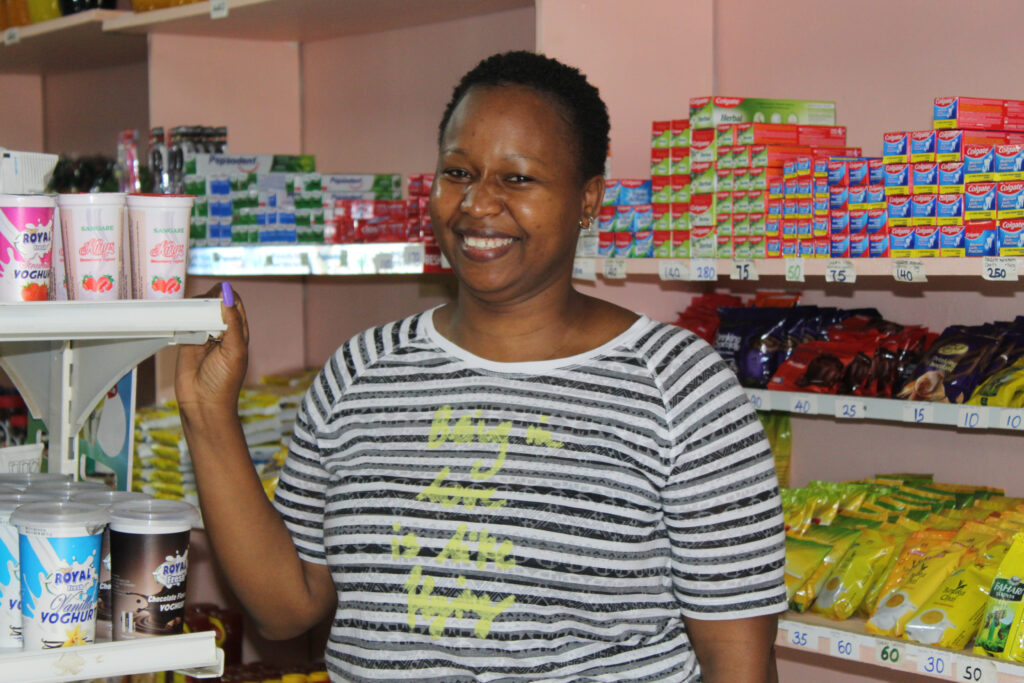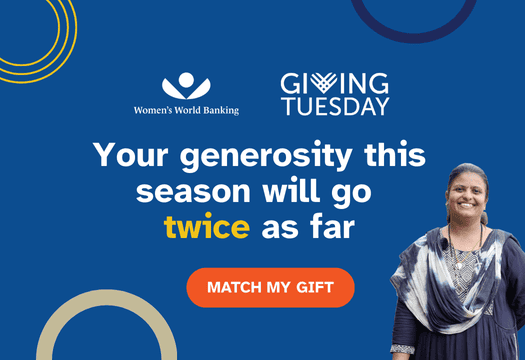To celebrate Women’s World Banking’s 45th anniversary, we are showcasing the voices of individuals from around the world who have shaped and touched the Women’s World Banking journey since its inception in 1979 at Commission on the Status of Women till today.
These are stories from across Women’s World Banking’s reach, from women we serve and our customers, to allies and women in leadership who have contributed to women’s economic empowerment and financial inclusion.
Meet Sarah Mwanthi. In 2020, she had an exciting opportunity that she just couldn’t pass up, even though she was already a teacher—and despite the global pandemic. Although shifting career paths to start her own business wasn’t easy, during the peak of COVID-19 no less, she says she still has no regrets. Now, nearly four years later, business is good at her Kikwetu General Shop. In fact, she says her sales have increased by a whopping 50%.
Ms. Mwanthi’s mini-mart, set at a busycorner location off of a road bustling with vendors in Thika, Kenya, represents just one of the few businesses formally owned by women in Kenya (31%), and demonstrates the massive gender gap in business ownership. Women entrepreneurs face unique challenges, including lack of collateral required for traditional loans, such as land. Only 1% of women in Kenya own land in their names and 5–6% jointly, but contribute to 80% of the workforce in largely agricultural communities. Additionally, women are often time-poor as they’re still expected to take on the majority if not all of the parenting as well as household duties, in addition to running their business.

While gender data alliance organization Data2X predicts that Kenya is on its way to fully closing its gender gap in access to financial services within the next decade, women entrepreneurs must face business-related issues on top of gender and cultural expectations. Concerns around inflation, reliability of goods delivery and poor cashflow can pose challenges—once, Ms. Mwanthi was $65 short for a supplier payment—but loans geared toward women business owners can help them address these issues or, ideally, anticipate them so they can be managed in advance or avoided altogether.
Women’s World Banking Asset Management (WAM) portfolio company, Pezesha, is a woman-founded Kenyan fintech company geared toward digital lending for micro, small and medium enterprises (MSMEs)—which are most often run by women. In 2022, WAM’s Fund II led a funding round that raised $11 million to help Pezesha scale its operations in its core markets as well as expand into new markets within Sub-Saharan Africa. Pezesha’s digital credit solution offers low interest rate loans, requires no collateral and no guarantors, asks for minimal paperwork, and provides quick disbursement upon loan approval. Notably, 45% of Pezesha’s clients are women. “It has really helped me be able to increase my cash flow,” Ms. Mwanthi says of working with Pezesha, which has provided her with five loans and increased her credit line from an initial $65 to $98. The increase in cashflow from these loans has helped her grow her business by diversifying her product offerings and serving a larger customer base. Ultimately, in the four months after receiving her loans, Ms. Mwanthi’s sales have increased significantly—by 50%.
“Pezesha imeniwezesha,” she says with a smile, which loosely translates to “Pezesha has enabled me.”
As part of our current strategy, we’ve helped provide 50 million women in emerging markets – targeting 100 million by 2027 – access and use of financial products and services that are transforming women’s lives, households, businesses and communities, and driving inclusive growth globally.
Help us reach the nearly billion women still excluded from the formal financial system. Donate now.
Explore Other Stories in Making Finance Work for Women for 45 Years




